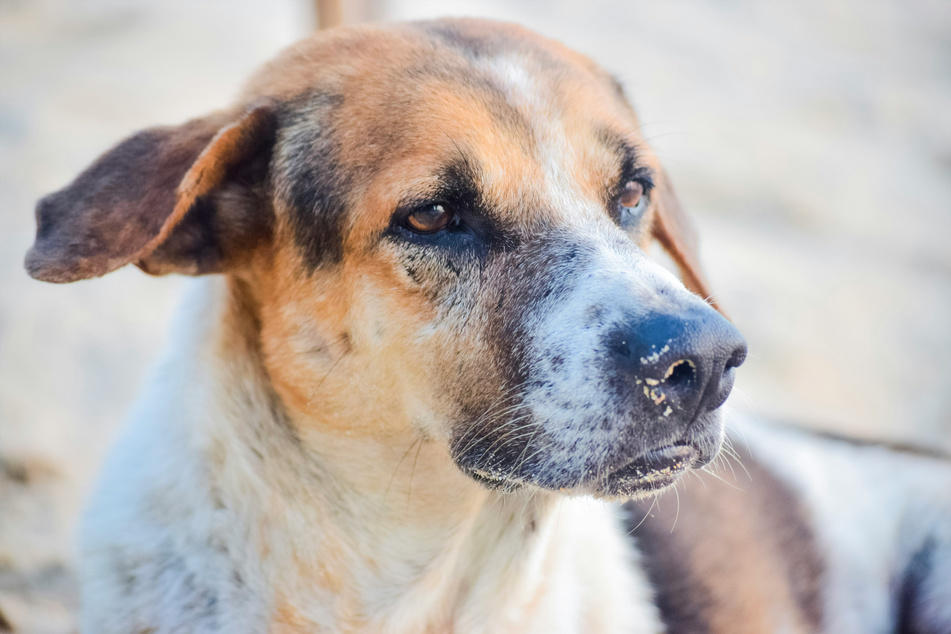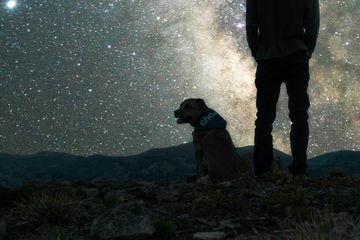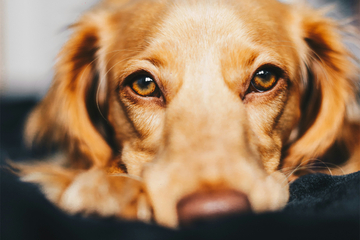Can dogs get sick from humans?
As a dog owner, you've likely wondered whether you should keep away from your pup when you're sick. It's likely that you figured a minor cold won't be dangerous to your four-legged friend, but could you have been wrong? Can dogs get sick from humans?

Things get miserable in the house when someone or something is sick. The constant complaining, the excessive use of hand sanitizer, and the endless piles of tissues can make you feel like you're drowning in a fountain of boogers and snot.
Yet, as bad as your cold might have been, it would be even worse if your darling doggo got similarly sick.
Could that be possible, though?
Can dogs get sick from humans? Can they catch the common cold, or even the flu? What are the risks associated with dog ownership, and can humans also get sick from their dogs? Let's take a look.
Can dogs get sick from humans?
While it is admittedly rare, dogs can catch a variety of diseases and infections from humans. There are a number of different viruses, for example, which attack both humans and dogs, and can be spread within a household. As a result, when you have certain illnesses, it might be good to keep your distance.
The good news, though, is that most illnesses will develop their own forms within you and within your dog, adapting to their host's body in a way that makes it much harder to transfer between two different species than it may be to transfer within either a group of humans or dogs.
Here are the most common illnesses your dog can get from humans:
- Bacterial infections such as salmonella: There are a variety of bacterial infections that can attack both humans and dogs, and can easily be passed on by touch. Others like salmonella can be passed on through food you both eat.
- Skin infections: In a similar vein to a bacterial infection (in many cases, these will be both), skin infections can be passed on easily between dog and human. This goes both ways, as similar infections and skin fungi can attack both species.
- Tuberculosis: An extremely dangerous and deadly respiratory disease characterized in humans by coughing, shortness of breath, and severe fever, tuberculosis has been found in dogs as well. It can also be transferred between owner and pup.
- Covid-19: As you likely know, the respiratory virus Covid-19 has been known to infect animals, and dogs as well. In many cases, dogs got the virus from their infected humans, though it was rarely seen to be transferred the other way around. In most cases, Covid-19 will cause very few (if any) symptoms in your darling doggo.
- Parasites like ringworm or fleas: There are a vast assortment of different parasites which can be transferred from human to dog or dog to human. These include, but are not limited to, dog fleas, ringworm, and giardia.
- Mumps: Yes, your dog can get the mumps. Luckily, though, we only know that because researchers have found the antibodies in some dogs. It causes no symptoms.
Important: While unlikely to transfer, several of these health issues (tuberculosis in particular) can be extremely dangerous and even deadly for both you and your dog. If you discover such illnesses in either party, make sure to seek professional health advice and, of course, stay isolated from one another. For questions and if in doubt about the health of you or your dog, always consult a vet or your doctor.

Cold and dog flu
Research suggests that human influenza can infect dogs, but it is extremely rare and unlikely. Instead, dogs have their own forms of cold and flu, including a canine influenza strain that can attack dogs (but not humans), and causes very similar symptoms than what you would expect from a flu-riddled human.
Symptoms of canine influenza include:
- Cough
- Lethargy
- Runny nose
- Sore throat
- Sneezing
While in most cases canine influenza will be generally pretty easy for your dog to get over, in some cases it can be quite severe. Luckily, though, dogs who contract human influenza from their owners are unlikely to get noticeably sick.
Important: There are many different illnesses and diseases that can cause the symptoms of canine influenza. Additionally, in rare but possible situations, your dog may get quite significantly sick if it contracts a cold or dog flu. As a result of both realities, we'd recommend getting your dog checked out by the vet if it becomes symptomatic.
Human risks for dogs
Specific diseases and illnesses are not the only things dogs can catch from humans, as there are a variety of human-induced risks for dogs that live around humans. It is worth always keeping an eye on your dog's behavior and any potential symptoms that could be caused by human factors. While these risks aren't things transferred from human to dogs, they are significant.
Some significant human-induced risks include the following:
- Smoking and respiratory disease: Second-hand smoke is a thing for dogs, too, and can cause very severe respiratory disease and even cancer in the long-term. Additionally, nicotine is highly toxic for dogs, so the ashes and butts of cigarettes need to be kept well out of reach of your pup.
- Contaminated food and water: If you fail to keep your dog's food or water bowl clean, or serve your doggo out-of-date or badly prepared food, you could cause some serious health issues in your canine companion. Be careful, thoughtful, and use common sense.
- Poor sanitation: Basic sanitation is always necessary, whether you have a dog or not. Keep its litter box (if you use one) clean and make sure that the environment and floors are kept clean and clear so that your dog won't get sick from sanitary issues.
- Environmental risks: It's important to always pay attention to the environment in which your doggo currently resides. That goes for both at home and in public. While in the latter this simply means keeping your dog on the leash and being careful when crossing roads, at home this means making sure there's nothing sharp or dangerous in reach, including potentially toxic food, and everything has been generally dog-proofed.
As long as you are careful and responsible, most of these risks won't be anything to worry about. Simply keep your dog's food area and bathroom clean, dog-proof your house, and avoid smoking around your canine companion.
Can humans get sick from dogs?

While it is all well and good to give your dog all the love and care it deserves, ultimately your health and care should always come first.
As a result, it is important to note that there are a variety of health issues, some very serious, that can be transferred from dog to human. Many of these are considered serious medical emergencies, and may require hospitalization.
These are the most common dog-to-human health issues:
- Rabies: The most well-known and most dangerous dog-to-human risk is rabies, as it is incredibly deadly if not treated immediately or vaccinated against prior to infection. Usually transferred via a dog bite, the risk of rabies is heightened by the fact that it has a habit of making dogs very aggressive. Luckily, rabies is very rare in the US. Consult your doctor about vaccines and questions.
- Parasites: In much the same way that human parasites can pass on to dogs, dog parasites can pass on to humans and cause a very serious problem. The most common parasites to jump from dog to human are:
- Roundworm
- Giardia
- Tapeworm
- Fleas
- Bacterial infection: There are a vast selection of bacterial infections that can be passed on from dog to human, also including the likes of salmonella. It is very important to be careful, and this goes double when handling your doggo's feces.
- Fungal diseases: Similarly to bacterial infections, fungal issues can be passed on both from dog to human and human to dog. Most of these can be very unpleasant – though not usually fatal – so be cautious.
Important: In general, most dog owners will never catch something from their dog. There is one caveat to this rule, though, and it's hygiene. Practicing good hygiene when around dogs is extremely important, and there are a few steps to always take:
- Always wash your hands after touching your dog, and avoid it licking your mouth.
- Get rid of dog feces as quickly as possible and wash your hands immediately after handling, even when using gloves.
- Stay away from your dog when you are sick, and visa-versa.
- Get all required vaccinations.
- Keep any scratches and bites clean, and go to the doctor to make sure nothing nasty has been passed on.
- Keep your darling doggo as healthy as possible with regular vet visits.
You are unlikely to get sick from your dog
While it is possibly for you to catch some pretty nasty diseases from your dog, and even suffer through an infestation of parasites, the former is highly unlikely. Unless your dog is very sick and particularly aggressive or likely to bite, you will almost certainly never catch anything major from your darling doggo, assuming you're paying attention to hygine for both you and your pup.
The most likely issue you will face is, of course, the risk of parasite infestations. Fleas and other tiny little insects can easily attack your dog and spread around the home. So just be aware, and be prepared!
Cover photo: Unsplash/Lucie Helešicová





